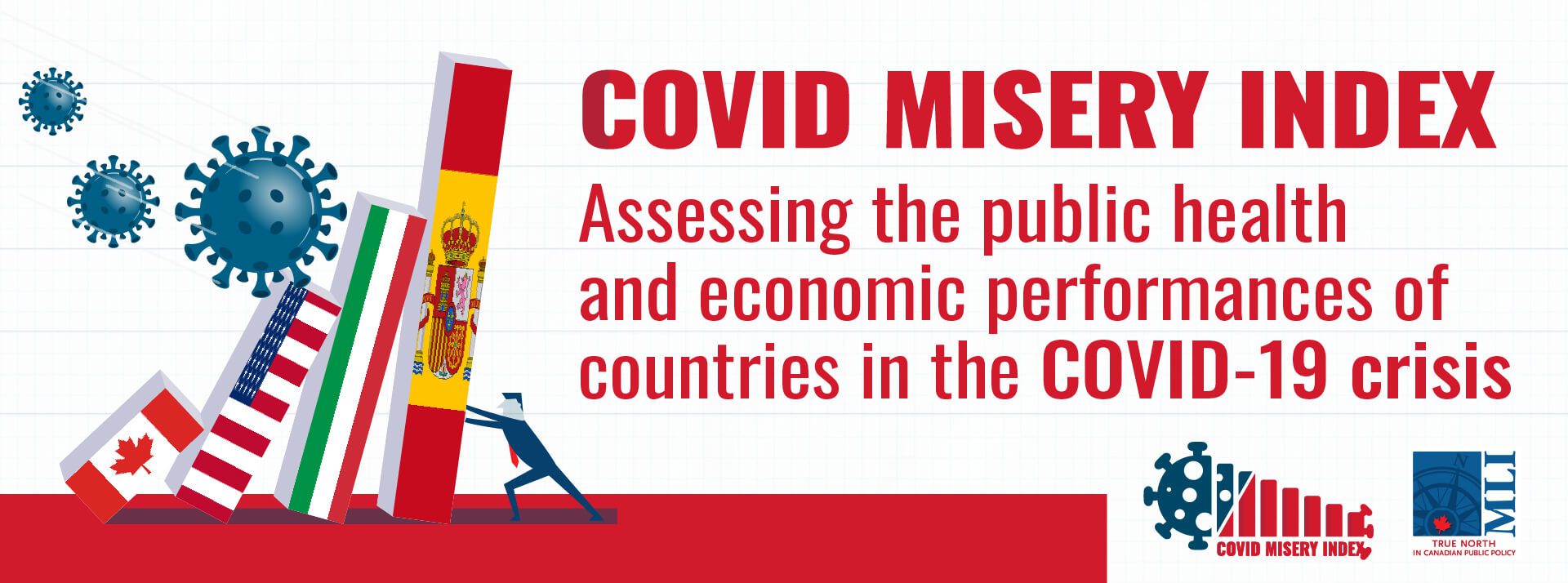 View the full, updated COVID Misery Index (CMI) here. Download the data for the September 17 update here. For more information, including a full methodology and analysis of the initial CMI, click here, and view the original, non-updated CMI here.
View the full, updated COVID Misery Index (CMI) here. Download the data for the September 17 update here. For more information, including a full methodology and analysis of the initial CMI, click here, and view the original, non-updated CMI here.
To find all the MLI products related to the CMI, click here.
THE LATEST CMI
With election day right around the corner, how well does Canada compare to peers in terms of protecting the health, wellbeing, and prosperity of its citizen over the entire course of the COVID-19 pandemic? MLI has the answers with the latest update of the COVID Misery Index.
MLI COVID Misery Index Update (September 17, 2021): The Macdonald-Laurier Institute’s COVID Misery Index is updated regularly as we follow the progress of 15 developed countries to preserve the health, well-being and prosperity of their citizens during the pandemic. There are three categories: Disease Misery, a measure of the impact of sickness and death from the disease, Response Misery, a ranking of how well governments are doing on measures such as the success of vaccine rollouts or having to rely on restrictive lockdown measures, and Economic Misery, which takes into account the impact on jobs, growth and government finances.
CANADA’S COVID PERFORMANCE: HIGH COST, MIDDLING RETURNS
In calling the federal election, Prime Minister Trudeau cited the need for a mandate to steer Canada out of the on-going COVID-19 crisis. In light of this motivation for calling an early election while the crisis persists, we think Canadians should take a moment to assess the country’s performance in managing the pandemic thus far.
The Macdonald-Laurier Institute’s COVID-19 Misery Index examines how 15 countries compare in terms of the health impacts of the disease itself (Disease Misery), the policy responses to the disease (Response Misery), and its impact on their economies (Economic Misery). For the past six months, the Index has tracked established metrics for these three categories, and graded countries on their performance.
In this update, Canada remains in the middle of the pack, ranking 9th position overall and earning a C+ grade (full results available here).
The impact of the disease itself has been lower in Canada than many other comparator countries, notably the US and western European nations. Canada experienced lower incidence of the virus, resulting in fewer hospitalizations, ICU admissions and deaths. The one blemish on Canada’s record for managing Disease Misery is a persistently high rate of excess deaths for the population aged 15 and older, and for our most vulnerable seniors. Canada shifted gears quickly to prepare the health system for an onslaught of COVID cases but, in so doing, restricted access to care for just about everything else. We anticipate these delays to access and treatment will have long term implications and will disproportionately affect those already experiencing other health disadvantages.
In terms of Response measures, although it was slow to get started, Canada’s vaccination program is now amongst the best in the world, with almost 75 percent of all Candians getting a first dose and just under 70 percent receiving a second dose. For eligible Canadians, (that is, those aged 12 and older), close to 85 percent have received at least one dose and over 77 percent are fully vaccinated. As a result, Canada earns a grade of B+ for Response Misery at this time. However, the data over the past six weeks suggest that uptake is now slowing. The emergence of the delta variant here has slowed the return to normalcy. Without a significant uptick in the vaccination rate, we will continue to be susceptible to further outbreaks and lockdowns.
We only have to look to the United States and the United Kingdom to see the repercussions of plateauing at relatively low vaccination rates. The US, in particular, had appeared to be vaccinating its way out of the pandemic, but stalled at just over 60 percent of the population with first vaccinations and slightly more than 50 percent having two shots, despite the abundant availability of vaccines. The US continued to ease its few response restrictions, allowing the delta variant to run amok and resulting in another wave of cases, hospitalizations and deaths. The urgency to get a larger proportion of the public vaccinated has waned, despite pleas from President Biden and other administration officials, with disastrous consequences.
In Canada, the closest parallel we have to the US situation is Alberta which, despite its low vaccination rate, also largely abandoned public health restrictions early in the summer. The effects of this decision have been tragic, with an upswing in cases, hospitalizations and mortality.
Fighting the pandemic has imposed a significant financial burden on Canada. Overall, Canada has experienced the most economic misery in our Index, earning a failing grade in the Economic Misery category. The economic fallout has been severe, with increased unemployment and very little progress towards returning to pre-pandemic levels, as we have seen in other countries. Canada’s unemployment rate is 7.5 percent and has just now returned to less than 2 percent above the pre-pandemic level. Only the US has had a more persistent increase in unemployment; however, they started from a much lower rate.
In addition, Canada has taken on substantial amounts of public debt that will likely take generations to repay. While we do expect the economy to recover, the second quarter of 2021 saw a 1.1 percent contraction of GDP and growth estimates for the remainder of the year are being revised downwards, with a potential fourth wave being a significant headwind for the economy for the remainder of the year. And with the election platforms of all parties promising tens of billions of dollars in new spending in the coming few years, prospects look increasingly grim for government debt measures well into the future.
COMPETITOR RANKINGS
Globally, Norway and New Zealand have experienced the least misery of the countries in our Index, garnering them both A+ grades. Norway has escaped the worst ravages of COVID-19 health impact to date, and its sovereign wealth fund has allowed it to avoid taking on significant public debt. New Zealand has maintained an elimination strategy, employing among the world’s most stringent lockdowns when faced with an outbreak. The ‘go hard, go early’ approach has been effective so far; however the country is currently in the midst of a small outbreak causing a steep reduction in economic activity and significant new debt, the impact of which is not yet reflected in our Index.
At the other end of the Index spectrum, the United States has declined significantly from its C+ ranking earlier in the year, now earning a failing grade.. As noted above, an aggressive vaccination strategy looked like it would allow the US to return to normal more quickly than elsewhere. The same could be said for the UK. Both countries have seen a slowing of vaccination uptake and, as restrictions have been largely lifted, both are experiencing an increase in case loads. The transmissibility of the delta variant has turned large gatherings – where mask wearing and social distancing is not commonly observed – into “super spreader” events.
LOOKING FORWARD
Canada’s best strategy as we encounter a growing fourth wave is to focus on increasing vaccination rates to as high a level as possible and to maintain the public health practices that have proven to be effective. This prudent approach should reduce the need for further lockdowns and other more drastic restrictions, and allow economic activity to resume.
Since our last update, Canada’s disease misery is slightly below average. Caseloads remain relatively low compared to other countries and our comparatively high overall vaccination rate has offered protection from severe COVID cases and death. However, the slowing rate of vaccinations is a concern. A return to a more normal life relies on a higher vaccination rate than we have currently achieved. Both the federal and provincial governments must make vaccinations the priority and take steps to reach those not yet vaccinated.
Richard Audas, Faculty of Medicine, Memorial University of Newfoundland. Senior Fellow at the Macdonald-Laurier Institute.




